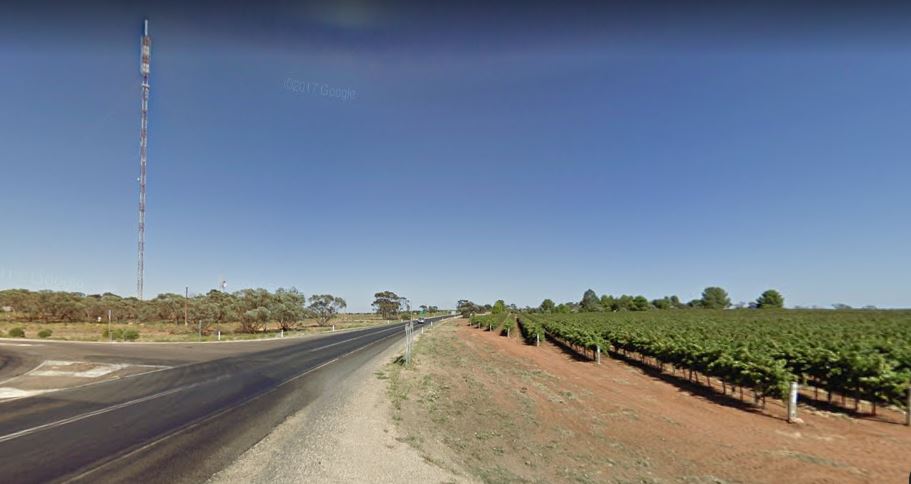The site was out on Karoonda Highway. On one side, the green swathe of Murray Barrandura’s vineyard, on the other a dusty khaki patchwork of Bush.
Two vehicles blocked the junction for Kingston Road – one I recognised as Murray’s faded blue ute. The other was Lachy Tuner’s Hilux.
‘Murray, Lachlan.’ I slammed the car door and came to stand beside them.
‘Rum thing,’ said Murray, scratching his thinning curls. ‘Not seen since Grandfather’s time.’
‘1930, the last one,’ said Lachy.
‘Did you see the flash?’ I said. ‘Lit up the sky like fireworks. Lucky it didn’t hit closer to town.’ The meteorite was the size of my fist, the surface like pumice flecked with chips of silica. ‘Made quite a hole.’
‘People got crook then.’ Murray sucked at his cheeks.
‘In 1930? That was flu. Meteorites don’t cause flu epidemics,’ scoffed Lachy.
Murray’s gaze drifted towards town, to the cluster of twinkling streetlights.
***
Written for What Pegman Saw, the prompt that uses Google Street View. This week, we are in Loxton, South Australia.
Notes
Back in 1930, a meteor shattered in the sky above Karoonda. The pieces weighed a total of 92 lbs.
Many Aboriginal cultures see meteors as harbingers, warnings of coming death or signs of evil spirits coming to suck water from the land. Read more here.
In Australian slang, crook means ill, likely to die.


Outside your normal milieu, but pitch-perfect as always. I loved the way you captured the taciturn masculinity of the characters. Great writing, Lynn!
LikeLiked by 1 person
Ah, thanks so much Penny. I liked the idea of those men, standing in a circle around something possibly momentous, but as you say, being very taciturn. Thanks so much for the kind words
LikeLike
Having recently watched videos about meteor hits etc, your story seems extraordinarily contemporary, almost prophetic. I would say ‘bang’ up to date, but that’s tempting fate 🙂
LikeLiked by 3 people
Ha! Only a matter of time. That footage from Russia a few years ago was pretty terrifying in itself, though edifying for special effects people I guess – it looked so much like a scene from a Hollywood blockbuster!
LikeLike
And one exploded over Canada this week. Though I don’t think it was major.
LikeLike
One day one is going to explode over a large population. Let’s hope that day isn’t soon
LikeLiked by 1 person
Apparently, now there’s enough satelites, and the space station, they’re able to get a better idea of how many enter Earth’s atmosphere. I don’t remember the figure. Most distintergrate or explode long before they reach land. Many land in the sea. But that number given was in the upper 3 digits. And we blythely go on with our lives, for what else can we do? It used to be thought, given warning we could nuke. Nope. They reform and continue along their way. A gentle nudge would be more effective. But there’s reports all the time of hits that the satelites didn’t even see until, whoosh. But, hey, how long have we lived on this planet?
The main culprit is the remains of a meteor they’d named Encke. It was a biggy. but now it’s breaking into smaller and smaller pieces. And smaller is more.
LikeLike
Interesting bit of history, and great portrayal of the understated characters. That must have been quite a thing to see, if you’d been looking at the sky at the right time. But I doubt your insurance would cover the damage if it landed on your property! I can see why people would interpret such an event as a harbinger of doom.
LikeLiked by 2 people
Thanks so much, Joy. You’re right about meteors being seen as signs of the momentous. On the Bayeux Tapestry there’s a depiction of Halley’s comet that appeared close to the Battle of Hastings in 1066 and was seen as a sign something momentous was to happen in England. Must have been an impressive sight. Myself, I’m hoping for Betelgeuse to go supernova in my lifetime – it will shine as brightly as a second Sun in the sky. Imagine that. Amazing 🙂
LikeLiked by 1 person
Makes me want to incorporate more celestial wonders in Eneana, hmm…..
LikeLike
It’s so brilliant! 😃
Do you live in Australia? How did you capture the characters and slangs so well?👏
Thank you for teaching about the meteor history too…!
LikeLike
Thanks so much! No, I’m in the UK but I did watch a lot of the Australian soap opera Neighbours at one time … 🙂
LikeLike
Lovely to see you Lynn! I love the local feel & dialect of this one, and especially the hint of foreboding. Suddenly I’m questioning everything!
LikeLiked by 1 person
Thank so much Karen. A great prompt 🙂
LikeLiked by 1 person
And not only Aboriginal people treat meteorites with reverence…
LikeLike
Very true and you can understand why. They make such a show in the sky, who could blame people for giving them extra significance.
LikeLike
I was thinking of Mecca and its meteorite in particular…
LikeLike
really like the way you connected the meteor history (wow 92 lbs) – and also liked the vibe and dialect as we had a snippet of this revealing convo
LikeLike
Thanks so much. Glad you liked it 🙂
LikeLiked by 1 person
Different subject matter for you, Lynn, but full of your observant little touches. And the ending feels hopeful. Loved these character’s exchanges. Felt real. Really real.
LikeLike
Ah, thanks so much Kelvin. I liked the idea of them all standing round, just staring at it, wondering what to do. A quiet start to something that could become bigger. Thanks so much for reading
LikeLike